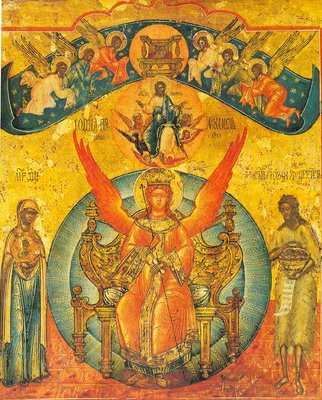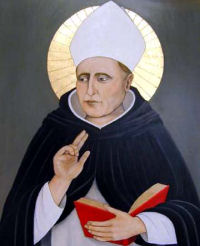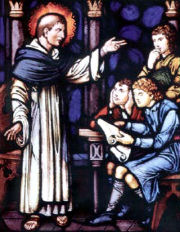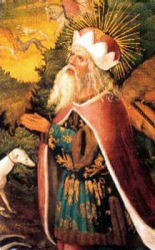
Holy Wisdom Sophia
early 18th Century
Moscow
Posted on 11/14/2014 8:56:55 PM PST by Salvation
St. Albert the Great
Feast Day: November 15
Born: 1206 :: Died: 1280
Albert was born in a castle on the Danube River in Swabia (southwest Germany) and was the son of a military nobleman. He studied at the University of Padua in Italy and there he decided to become a Dominican Priest.
His uncle tried to change his mind but Albert would not as he felt that this was what God wanted. His father, the count of Bollstadt, was very angry. The Dominicans thought that he would force Albert to come back home and transferred him to a location farther away. But his father did not come after him.
St. Albert loved to study. The natural sciences, especially physics, geography and biology, interested him. He also loved to study his Catholic religion and the Bible.
He used to observe the ways of animals and write down what he saw, just as scientists do today. He wrote a great number of books on these subjects. He also wrote on philosophy and was a popular teacher in different schools.
One of St. Albert's pupils was the great St. Thomas Aquinas. It is said that Albert found out about the death of St. Thomas directly from God. He had guided St. Thomas in beginning his great works in philosophy and theology. He also defended his teachings after Thomas died.
As St. Albert grew older, he became more holy. Before, he had expressed his deep thoughts in his writings. Now he expressed them in his whole way of living for God.
| Luke | |||
| English: Douay-Rheims | Latin: Vulgata Clementina | Greek NT: Byzantine/Majority Text (2000) | |
| Luke 18 |
|||
| 1. | AND he spoke also a parable to them, that we ought always to pray, and not to faint, | Dicebat autem et parabolam ad illos, quoniam oportet semper orare et non deficere, | ελεγεν δε και παραβολην αυτοις προς το δειν παντοτε προσευχεσθαι και μη εκκακειν |
| 2. | Saying: There was a judge in a certain city, who feared not God, nor regarded man. | dicens : Judex quidam erat in quadam civitate, qui Deum non timebat, et hominem non reverebatur. | λεγων κριτης τις ην εν τινι πολει τον θεον μη φοβουμενος και ανθρωπον μη εντρεπομενος |
| 3. | And there was a certain widow in that city, and she came to him, saying: Avenge me of my adversary. | Vidua autem quædam erat in civitate illa, et veniebat ad eum, dicens : Vindica me de adversario meo. | χηρα δε ην εν τη πολει εκεινη και ηρχετο προς αυτον λεγουσα εκδικησον με απο του αντιδικου μου |
| 4. | And he would not for a long time. But afterwards he said within himself: Although I fear not God, nor regard man, | Et nolebat per multum tempus. Post hæc autem dixit intra se : Etsi Deum non timeo, nec hominem revereor : | και ουκ ηθελησεν επι χρονον μετα δε ταυτα ειπεν εν εαυτω ει και τον θεον ου φοβουμαι και ανθρωπον ουκ εντρεπομαι |
| 5. | Yet because this widow is troublesome to me, I will avenge her, lest continually coming she weary me. | tamen quia molesta est mihi hæc vidua, vindicabo illam, ne in novissimo veniens sugillet me. | δια γε το παρεχειν μοι κοπον την χηραν ταυτην εκδικησω αυτην ινα μη εις τελος ερχομενη υποπιαζη με |
| 6. | And the Lord said: Hear what the unjust judge saith. | Ait autem Dominus : Audite quid judex iniquitatis dicit : | ειπεν δε ο κυριος ακουσατε τι ο κριτης της αδικιας λεγει |
| 7. | And will not God revenge his elect who cry to him day and night: and will he have patience in their regard? | Deus autem non faciet vindictam electorum suorum clamantium ad se die ac nocte, et patientiam habebit in illis ? | ο δε θεος ου μη ποιηση την εκδικησιν των εκλεκτων αυτου των βοωντων προς αυτον ημερας και νυκτος και μακροθυμων επ αυτοις |
| 8. | I say to you, that he will quickly revenge them. But yet the Son of man, when he cometh, shall he find, think you, faith on earth? | Dico vobis quia cito faciet vindictam illorum. Verumtamen Filius hominis veniens, putas, inveniet fidem in terra ? | λεγω υμιν οτι ποιησει την εκδικησιν αυτων εν ταχει πλην ο υιος του ανθρωπου ελθων αρα ευρησει την πιστιν επι της γης |

Saturday, November 15
Liturgical Color: Green
Today is the optional memorial of St.
Albert the Great, bishop and doctor of the
Church. Albert was a very learned man in
the natural sciences but his great love
was teaching theology. St. Thomas
Aquinas was among his students

Daily Readings for:November 15, 2014
(Readings on USCCB website)
Collect: O God, who made the Bishop Saint Albert great by his joining of human wisdom to divine faith, grant, we pray, that we may so adhere to the truths he taught, that through progress in learning we may come to a deeper knowledge and love of you. Through our Lord Jesus Christ, your Son, who lives and reigns with you in the unity of the Holy Spirit, one God, for ever and ever.
RECIPES
o Gulyas
o Nockerln
o Nockerln
ACTIVITIES
o Namedays
PRAYERS
o November Devotion: The Holy Souls in Purgatory
o Little Litany of the Holy Souls
o Litany of Saint Albert the Great
LIBRARY
o Saint Albert the Great | Pope Benedict XVI
o The New Age And Albertus Magnus | Edward O'Brien Jr.
· Ordinary Time: November 15th
· Optional Memorial of St. Albert the Great, bishop, confessor and doctor
Old Calendar: St. Albert the Great; St. Leopold of Austria (Hist)
Today the Church celebrates the optional memorial of St. Albert the Great, son of a German nobleman, who was studying at Padua when the Master General of the Dominicans, Jordan of Saxony, succeeded in attracting him to that Order. He was to become one of its greatest glories. After taking his degrees at the University of Paris he taught philosophy and theology at Paris and then in Cologne. St. Thomas Aquinas was among his pupils. His knowledge was encyclopedic. In 1260 he was named Bishop of Ratisbon and devoted himself zealously to the duties of his office. But soon resigned in order to continue his teaching and research. St. Albert died in Cologne on November 15, 1280.
St. Leopold of Austria is not on the Universal Roman Calendar but is included in the Roman Martyrology. He was born at Melk in Austria, a grandson of emperor Henry III. In 1096 he succeeded his father as fourth margrave of Austria. He married Agnes, daughter of Henry IV, by whom he had eighteen children. He ruled firmly and successfully for forty years, and was especially interested in the spread of religious institutions. He was the founder of Mariazell (Benedictine), Heiligenkreuz (Cistercian) and Klosternenburg (Augustinian). He was buried in the last mentioned monastery.
St. Albert the Great Albert, the "light of Germany," called the Great because of his encyclopedic knowledge, was born in 1193 at Lauingen, Donau. He studied at Padua, where under the influence of the second Dominican general, he joined the newly-founded Order of Preachers (1223). Soon he was sent to Germany, taught in various cities, particularly Cologne; Thomas Aquinas was his student. In 1248 he received the honor of Master in Sacred Theology at Paris. Throngs attended his lectures.
Albert, the "light of Germany," called the Great because of his encyclopedic knowledge, was born in 1193 at Lauingen, Donau. He studied at Padua, where under the influence of the second Dominican general, he joined the newly-founded Order of Preachers (1223). Soon he was sent to Germany, taught in various cities, particularly Cologne; Thomas Aquinas was his student. In 1248 he received the honor of Master in Sacred Theology at Paris. Throngs attended his lectures.
In 1254 Albert was chosen provincial of his Order in Germany. For a time he lived at the court of Pope Alexander II, who in 1260 made him bishop of Regensburg; two years later, however, he returned to his community at Cologne. There he acted as counselor, peacemaker, and shepherd of souls with great success. He died at the age of eighty-seven. Pope Pius XI numbered him among the ranks of the saints on December 16, 1931, and declared him a doctor of the Church. Much of his life was given to writing. His twenty-one folio volumes are devoted to commentaries on Aristotle (whose works were just then becoming known in the West) and the Bible. Legend credits him with drawing the ground plans for the cathedral at Cologne. Albert, the greatest German scholar of the Middle Ages, was outstanding in the fields of natural science, theology, and philosophy.
—Excerpted from The Church's Year of Grace, Pius Parsch
Albert is named "Doctor Universalis" because of his vast knowledge and writings.
Patron: Archdiocese of Cincinnati, Ohio; medical technicians; natural sciences; philosophers; schoolchildren; scientists; students; students of theology.
Symbols: crosier of a bishop; cap of the teacher; large book; cross over the sun, the moon and the earth (symbolizing his theological wisdom and knowledge of nature); Man dressed as a Dominican bishop lecturing from a pulpit; man arguing with Saint Thomas Aquinas; Dominican holding a globe, lecturing from a pulpit, or studying.
Things to Do:
St. Leopold of Austria Born at Melk, Austria, he was educated by Bishop Altman of Passau and succeeded his father as margrave of Austria when he was twenty-three. He married the daughter of Emperor Henry IV, by whom he had eighteen children, in 1106, founded the monasteries of Heiligenkreuz in the Wienerwald, Klosterneuburg, near Vienriazell in Styria, and was known for his piety and charity. He refused the imperial crown when his brother-in-law Henry V died in 1125. Leopold died after reigning as margrave for forty years at Klosterneuburg. He was surnamed "the Good" by his people and was canonized in 1486.
Born at Melk, Austria, he was educated by Bishop Altman of Passau and succeeded his father as margrave of Austria when he was twenty-three. He married the daughter of Emperor Henry IV, by whom he had eighteen children, in 1106, founded the monasteries of Heiligenkreuz in the Wienerwald, Klosterneuburg, near Vienriazell in Styria, and was known for his piety and charity. He refused the imperial crown when his brother-in-law Henry V died in 1125. Leopold died after reigning as margrave for forty years at Klosterneuburg. He was surnamed "the Good" by his people and was canonized in 1486.
—Excerpted from the Dictionary of Saints, John J. Delaney
St. Leopold is the patron saint of Austria. This day is called Goose Day in Austria, another harvest festival that includes traditional menus of roast goose and the drinking of the new wine.
Patron: Austria (so named in 1663); death of children; large families; Lower Austria; step-parents; Upper Austria.
Symbols: Armed count with a cross on his coronet, a banner with three eagles, and a model of the church of Heiligenkreuz in his hand; before the Blessed Virgin Mary and Saint Anne; hunting with his courtiers, and finding his wife's veil near the monastery of Klosterneuburg; with Saint Jerome; with his building Klosterneuburg; with the Blessed Virgin Mary appearing to him while hunting and the veil nearby.
Things to Do:
Also known as
Profile
Son of a military nobleman. Dominican. Priest. Taught theology at Cologne, Germany, and Paris, France. Teacher of Saint Thomas Aquinas. Influential teacher, preacher, and administrator. Bishop of Regensburg, Germany. Introduced Greek and Arabic science and philosophy to medieval Europe. Known for his wide interest in what became known later as the natural sciences – botany, biology, etc. Wrote and illustrated guides to his observations, and was considered on a par with Aristotle as an authority on these matters. Theological writer. Doctor of the Church.
Born
Dear Scientist and Doctor of the Church, natural science always led you to the higher science of God. Though you had an encyclopedic knowledge, it never made you proud, for you regarded it as a gift of God. Inspire scientists to use their gifts well in studying the wonders of creation, thus bettering the lot of the human race and rendering greater glory to God. Amen.
Additional Information
Readings
It is by the path of love, which is charity, that God draws near to man, and man to God. But where charity is not found, God cannot dwell. If, then, we possess charity, we possess God, for “God is Charity” (1 John 4:8) Saint Albert the Great
“Do this in remembrance of me.” Two things should be noted here. The first is the command that we should use this sacrament, which is indicated when Jesus says, “Do this.” The second is that this sacrament commemorates the Lord’s going to death for our sake. This sacrament is profitable because it grants remission of sins; it is most useful because it bestows the fullness of grace on us in this life. “The Father of spirits instructs us in what is useful for our sanctification.” And his sanctification is in Christ’s sacrifice, that is, when he offers himself in this sacrament to the Father for our redemption to us for our use. Christ could not have commanded anything more beneficial, for this sacrament is the fruit of the tree of life. Anyone who receives this sacrament with the devotion of sincere faith will never taste death. “It is a tree of life for those who grasp it, and blessed is he who holds it fast. The man who feeds on me shall live on account of me.” Nor could he have commanded anything more lovable, for this sacrament produces love and union. It is characteristic of the greatest love to give itself as food. “Had not the men of my text exclaimed: Who will feed us with his flesh to satisfy our hunger? as if to say: I have loved them and they have loved me so much that I desire to be within them, and they wish to receive me so that they may become my members. There is no more intimate or more natural means for them to be united to me, and I to them. Nor could he have commanded anything which is more like eternal life. Eternal life flows from this sacrament because God with all sweetness pours himself out upon the blessed. - from a commentary by Saint Albert the Great on the Gospel of Luke

Saint Albert the Great, Bishop and Doctor of the Church
Render a just decision for me against my adversary. (Luke 18:3)
How often, when you hear this story, do you picture a stocky old woman with a grating voice—someone whose talent for nagging resembles the persistence of a cold sore or an ingrown toenail? Maybe a better approach would be to look at her as a model of confidence, contentment, and courage.
It’s possible that this woman’s persistence came from her confidence in God and his provision. You can imagine her conviction that God would never abandon one of his children.
In addition to confidence, imagine how content this woman might have been. She persisted in prayer even as she waited on God’s timing. Though we don’t know why God sometimes delays, we can learn, like her, to be patient and to pray continually, not out of desperation but in hope. Such prayer can calm our hearts. It can teach us that in praying and obeying to the best of our ability, we are doing all that God asks of us. The rest is up to him, and he will answer according to his infinite wisdom.
Finally, imagine how courageous this widow must have been. It takes fortitude to soldier on when things aren’t going your way. It’s tempting to lose hope when your prayers are not immediately answered. Obstacles and setbacks may lead you shrink back and try not to bother God anymore, lest he become angry and punish you. It takes a certain amount of courage to keep reminding Almighty God of your needs—and this woman seems to have had it!
Jesus ended his parable by asking whether, when he returns, he will find any faith on the earth. This was not an arbitrary question that he stuck in as an afterthought. The kind of faith Jesus is looking for is the faith of this persistent widow: a faith of confidence, contentment, and courage. When we have faith like this, our prayers are not filled with desperate begging but with joyful expectancy. So don’t be afraid to place your needs before the Lord. You don’t have to wear him down before he will act!
“Lord, help me become more confident in your goodness and content to let things unfold according to your will. Give me the courage to persist in my prayer, even as you give me the peace of knowing that you will work things out for my good.”
3 John 5-8; Psalm 112:1-6
Daily Marriage Tip for November 15, 2014:
Colder weather brings us indoors. Do you have indoor hobbies to share with your spouse? Puzzles, board games, crafts, etc. Recreational time together builds friendship and intimacy.
| Pray With Faith | ||
|
||
|
November 15, 2014. Saturday of the Thirty-second Week in Ordinary Time
|
||
|
|
||
|
By Father Edward Hopkins, LC Luke 18:1-8 Then Jesus told them a parable about the necessity for them to pray always without becoming weary. He said, "There was a judge in a certain town who neither feared God nor respected any human being. And a widow in that town used to come to him and say, ´Render a just decision for me against my adversary.´ For a long time the judge was unwilling, but eventually he thought, ´While it is true that I neither fear God nor respect any human being, because this widow keeps bothering me I shall deliver a just decision for her lest she finally come and strike me.´" The Lord said, "Pay attention to what the dishonest judge says. Will not God then secure the rights of his chosen ones who call out to him day and night? Will he be slow to answer them? I tell you, he will see to it that justice is done for them speedily. But when the Son of Man comes, will he find faith on earth?" Introductory Prayer: I believe in you, Lord, for you are mine and have proved your love for me. I trust you, for you have never let me down and know what is best for my life. I love you Lord for all your gifts. I desire to love and to do your will. Petition: Teach me to pray always, Lord. 1. Becoming Weary: We can become weary in prayer when we don’t see results. This happens because either we have a distorted idea of prayer, or we have taken on worldly views that undermine our appreciation for its true value, or simply because we experience what seems to be failure in prayer (Cf. Catechism of the Catholic Church, nos. 2726-2728). Prayer is a gift and comes from the Holy Spirit. It is neither a machine nor a magic formula. It requires effort on our part, for it is an act of love, self-giving. Prayer works if I persevere and allow God to act. Sometimes I will not see its effects. To continue to seek God in prayer is already the best fruit of prayer. Do I depend on him? 2. The Judge: If prayer is about giving myself and depending more on God, then it becomes a question of how I understand God. I depend only on those I trust, and I trust only those who have proven their love and ability to support me. Do I really believe God is all good, all-loving and all-powerful? Do I believe he cares about me? God for us is a judge, but so much more. He is first of all a loving father and a dedicated, unconditional savior and lover. As a loving Father he wants our trusting dependence. He wants us to believe. 3. The Chosen Ones: Who are we for God? We are more than simple creatures, more than worthless slaves. We are beloved children, for whom he died and to whom he gives everything. We are the frustrated scholars and broken lovers that he desires to raise up to share his infinite truth and love. We are chosen ones, chosen for him, for happiness, forever. Out of the darkness and slavery of sin, he frees us so that his glory will shine in us. Now, if we are all this and more for God, why do we doubt in prayer? Let us place all our confidence in him. Conversation with Christ: Dear Lord Jesus, increase my knowledge of your love for me. Help me to trust you in my everyday life. Open my heart to persevere in prayer. Grant me the humility to see how I need to pray, always and in so many ways. Teach me what prayer is and how to do it well for love of you. Resolution: Throughout the day, I will dedicate myself to simple, small invocations and prayers that express my love, gratitude and trust in God. |
Language: English | Español
All Issues > Volume 30, Issue 6
|
||||||||||||||||||||||||||||||||||||||||
“First and foremost, the right to life of every human person – from conception to natural death – is the primary and thus most essential of all human rights,” the letter stated. “Faith teaches and human reason confirms that human life is not a privilege bestowed on us by others, but rather a right that society must recognize and protect.
"As Christians, we are called to witness to an authentic ‘human ecology’ which safeguards all human life – no matter how frail or impaired – from being manipulated or destroyed.”
Bishops of Wisconsin
VOTE FOR LIFE!
Disclaimer: Opinions posted on Free Republic are those of the individual posters and do not necessarily represent the opinion of Free Republic or its management. All materials posted herein are protected by copyright law and the exemption for fair use of copyrighted works.